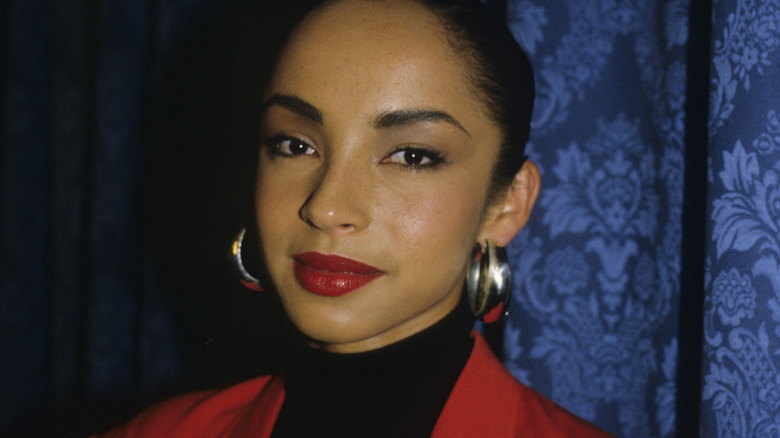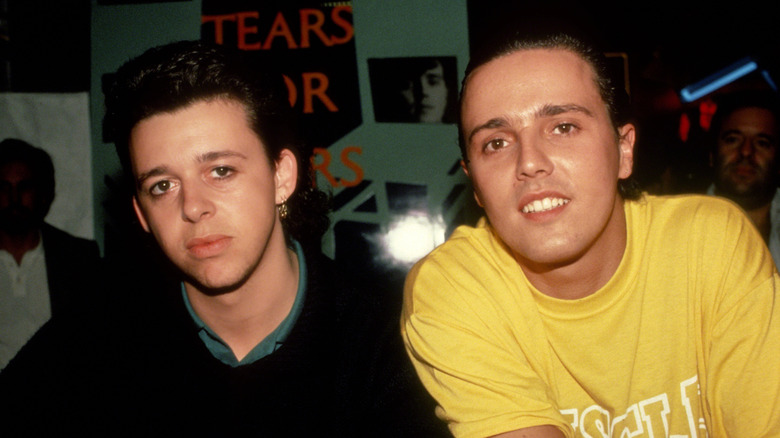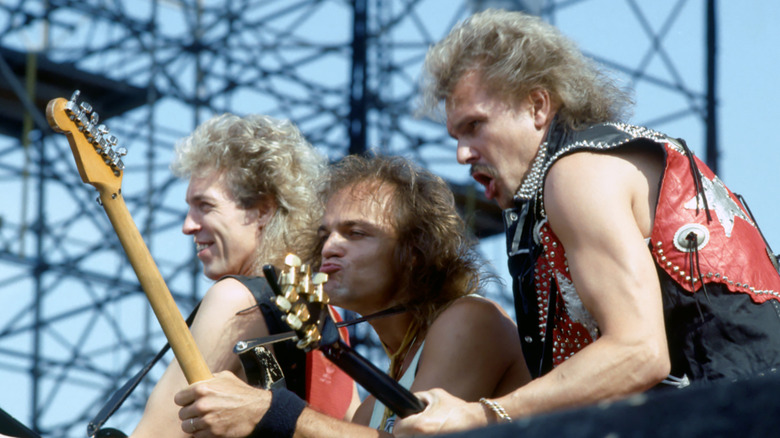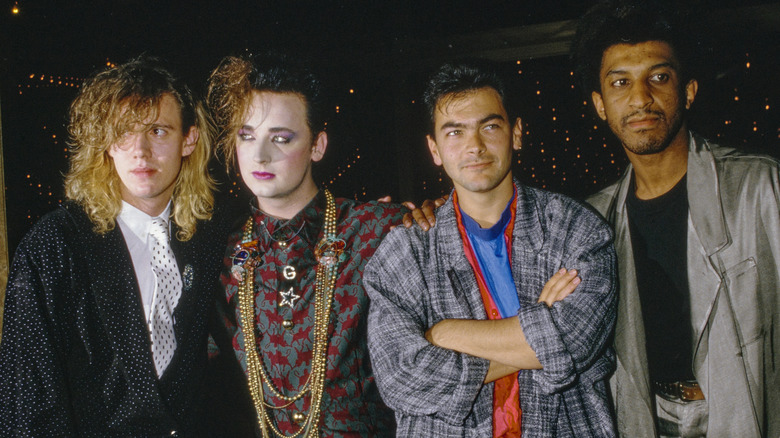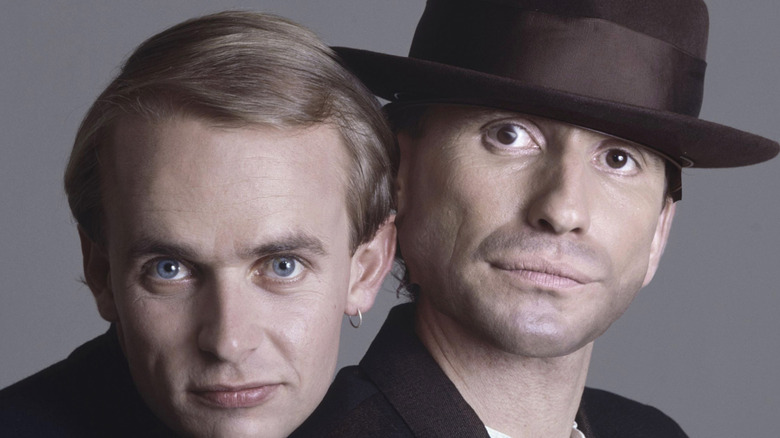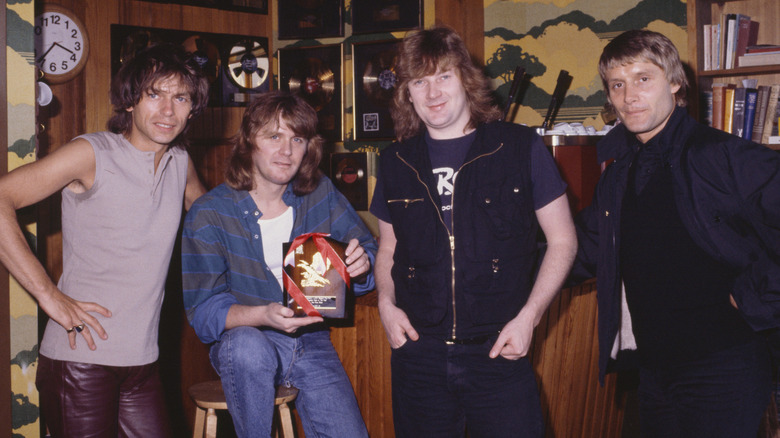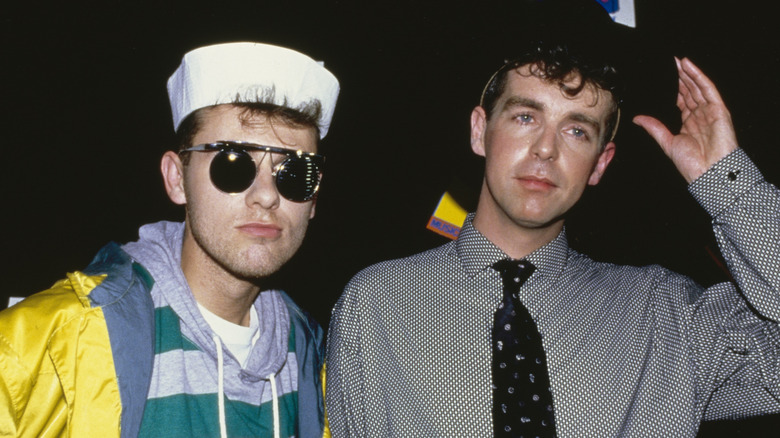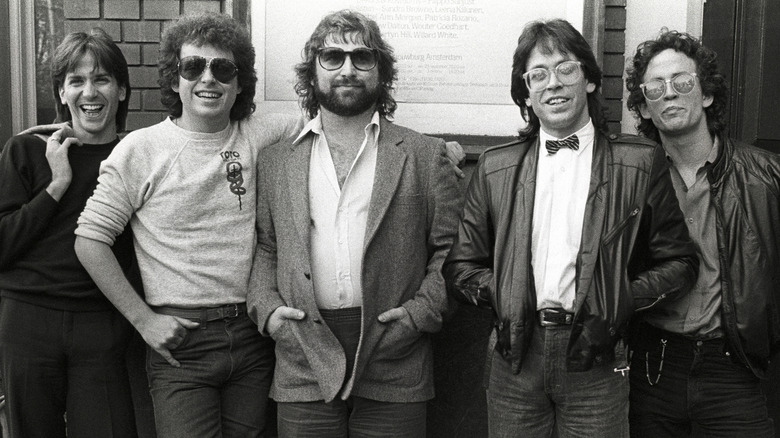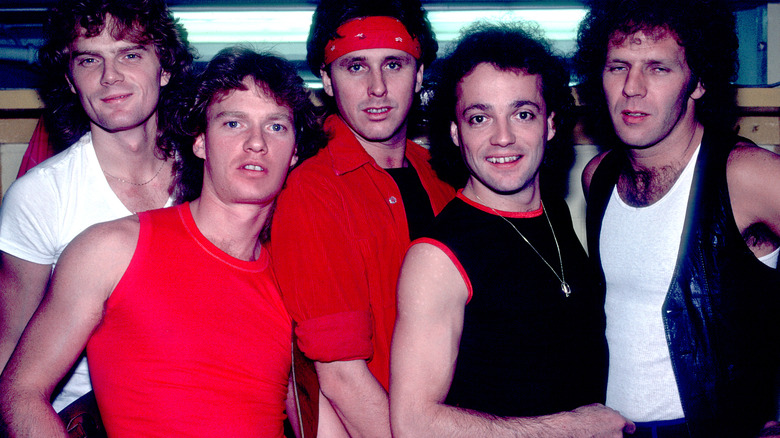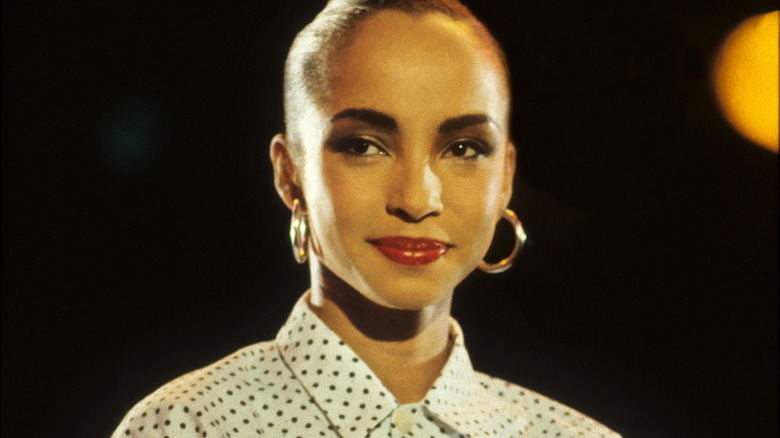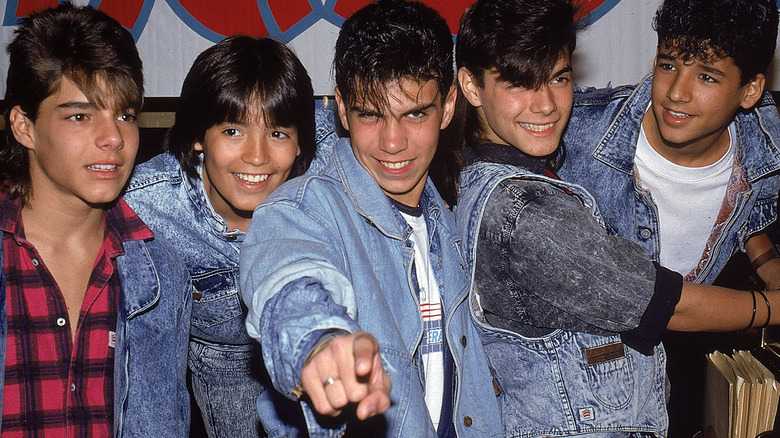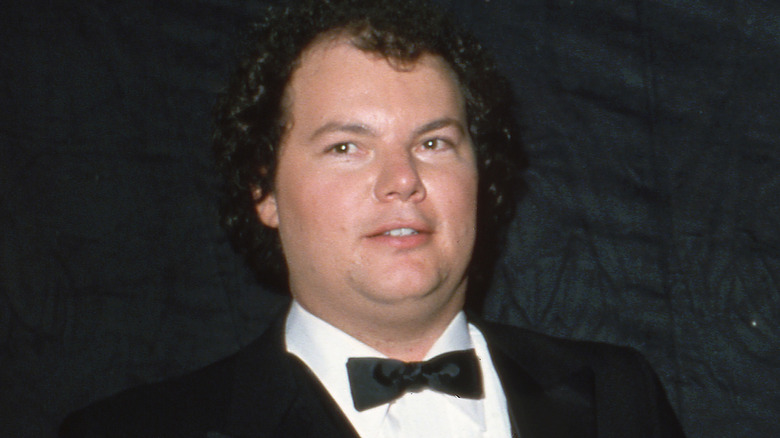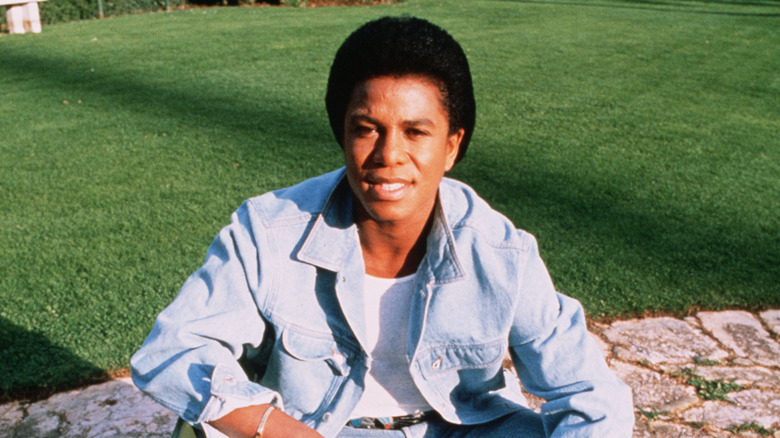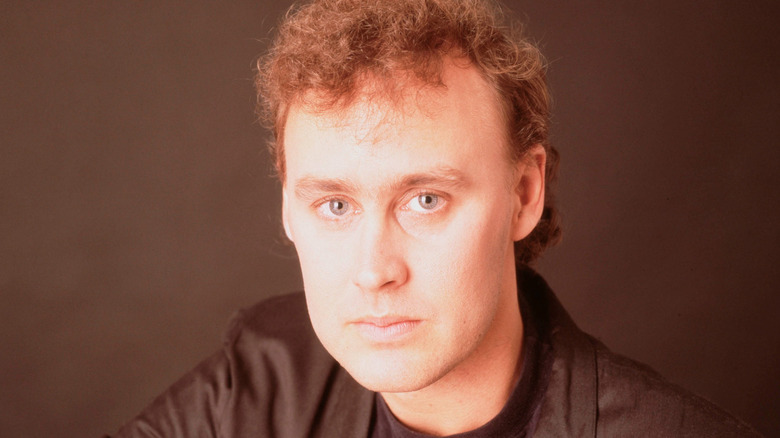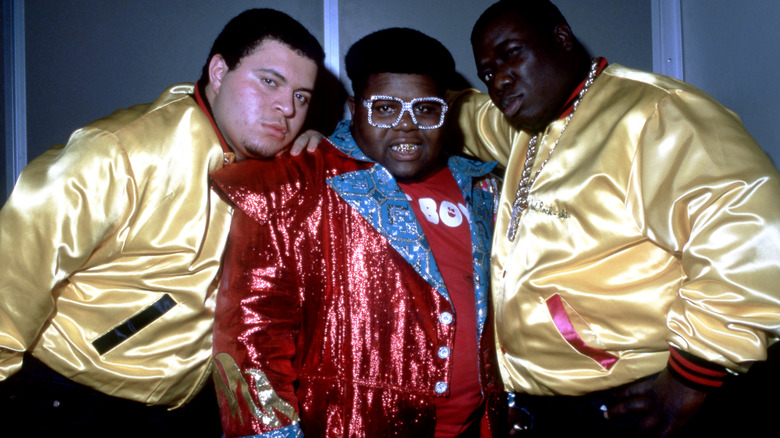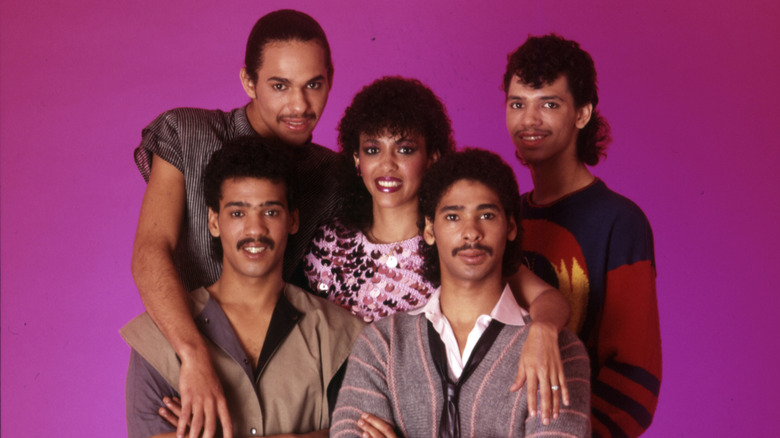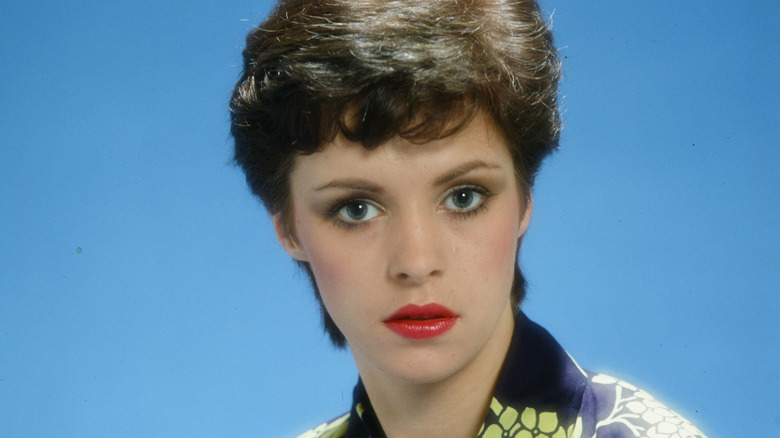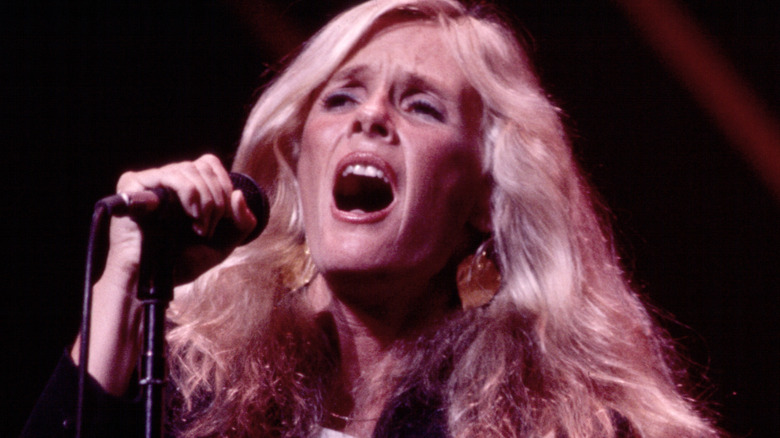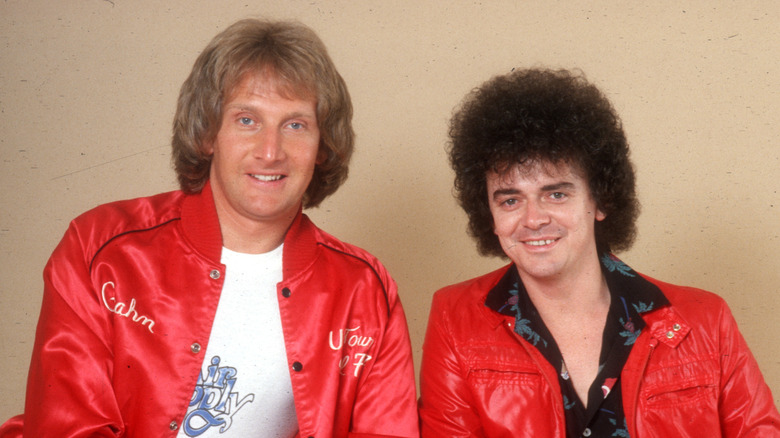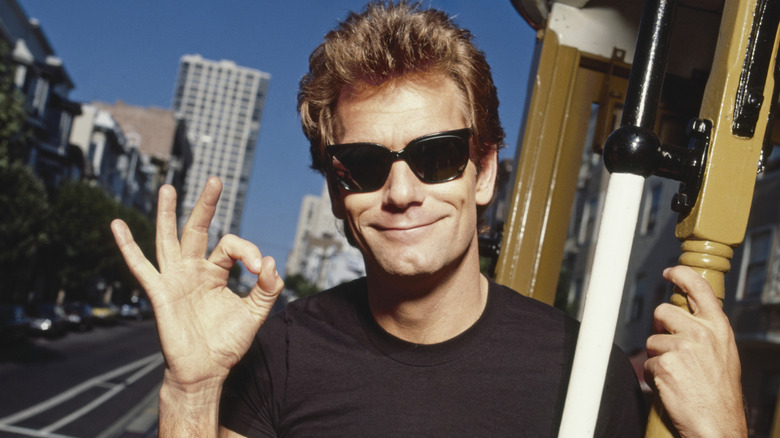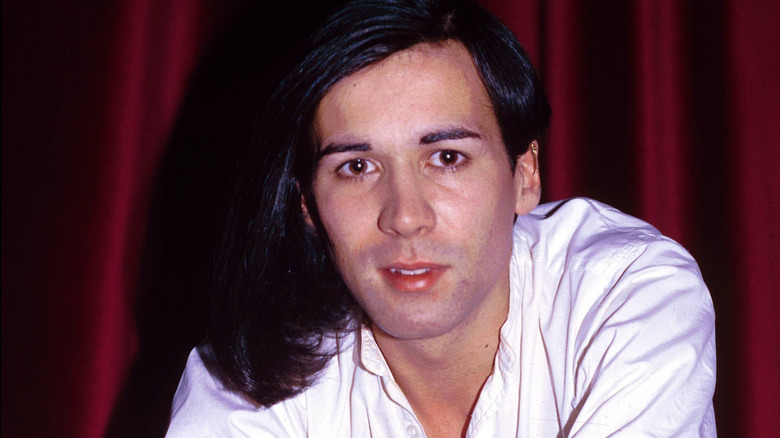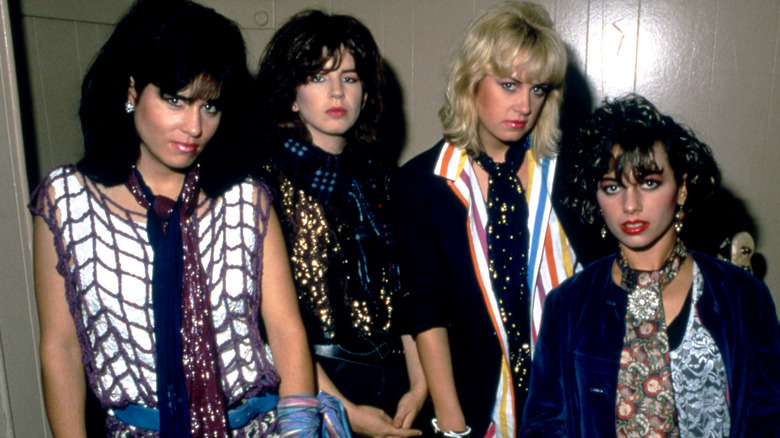'80s Musicians We Completely Forgot About
There's certain iconography and cultural trends we've all agreed are representative of the 1980s. It's not wrong to think that it was a decade consumed with materialism, bright colors, and the Cold War, and that the soundtrack of the time was heavy metal, New Wave, and synthesizer-driven dance-pop. But as the '80s move further and further away into history and the collective memory, many important and popular musical acts of the day have seen their stature fade away, too.
Ten years is a long time, and the 1980s were rich with musical talent. It wasn't all sad British guys with keyboards and party-hard Americans with guitars and flowing tresses. Musically, the '80s seems like several decades rolled into one, with established acts of yesteryear competing with newcomers for radio airplay, record-store space, and attention on that newfangled music machine called MTV. Some of those new acts were bound to be forgotten when the artists stopped making music or failed to evolve, or fans simply moved on. Here are some quintessentially 1980s musicians who have largely been lost to time.
Tears for Fears
If there's one musical instrument synonymous with the 1980s, it's the synthesizer, and Tears for Fears used it for all it was worth. Variously ominous, sweeping, or overwhelming, Tears for Fears' lush soundscapes both belied and emphasized its often serious and sad lyrics as the duo of Roland Orzabal and Curt Smith found a place just between New Wave and goth rock. "Everybody Wants To Rule the World" is about Cold War-era tyrants and power madness, and "Shout" is a generalized protest song that explores mental health themes. The bright, upbeat, and superficial '80s proved to be surprisingly hospitable to Tears for Fears, as both of those songs went to No. 1 in the United States. "Head Over Heels," a bittersweet love song in a vaguely unsettling key, hit No. 3.
Tears for Fears spent years working on their follow-up album, returning at the end of the 1980s with a brand new but old sound. "Sowing the Seeds of Love," an unabashed homage to the Beatles' experimental period, reached No. 2 on the American pop chart and No. 1 on the just-formed alternative rock chart. Just after, Smith left Tears for Fears, turning the duo into a solo act. "Break It Down Again" was a sizable and final hit in 1993 for the band so wrapped up in '80s social and political themes.
Scorpions
Just as there was a "British Invasion" of musical acts to American airwaves and record stores in the 1960s, a "German invasion" followed in the 1980s. Several artists who either hailed from West Germany or performed in German placed a hit or two on the charts, such as Nena, Trio, Alphaville, and Falco. Only Scorpions had the staying power. And that's because the band knew the language — yes, its songs were in English, but it understood the hard-rock climate of the time. Listeners wanted anthemic pop that also prominently featured wicked-fast shredding and guitar solos. Scorpions, which had first formed way back in 1965, obliged, as '80s metalheads loved the band's menacing but melodic compositions such as "No One Like You," "Big City Nights," and "Rock You Like a Hurricane."
Ironically, Scorpions' biggest hit was also its last one, and it was a sincere ballad at that. Written to commemorate the fall of the Berlin Wall, "Wind of Change" peaked at No. 4 in 1990 and became something of a theme song for the decline of European communism, a period marked by the collapse of the Soviet Union and the reunification of Germany. Scorpions are still active, technically, but founder Rudolf Schenker is the only original member left in the classic band.
Culture Club
A totemic icon of the 1980s, Boy George was never forgotten, but Culture Club's contributions to music have been overlooked in the wake of the lead singer's celebrity. As much of a fashion figure as he was a musical one, leader Boy George dressed in a flashy and androgynous fashion and deftly avoided questions about his sexuality and personal identity. On record, Culture Club meshed danceable pop with New Wave rock, as heard on emotion-forward hits including "Karma Chameleon," "Church of the Poison Mind," "Miss Me Blind," "It's a Miracle," and "The War Song." Culture Club's popularity lasted for only about three years, mostly because the group's members were so sick of one another that the band broke up in 1986.
Boy George made headlines into the 1990s and beyond for his solo career (he sang the hit theme song to the 1992 movie "The Crying Game"), his theatrical aspirations (his 2003 Broadway musical "Taboo" flopped), and his arrest and 2009 prison sentence for kidnapping a sex worker.
Men at Work
In the 1980s, American pop culture was inundated with content from Australia. Outback Steakhouse, TV battery ad pitchman Jacko, and the films "Crocodile Dundee" and "Young Einstein" all came after Men at Work scaled the charts. The combo of the alternately exasperated and wailing vocals of frontman Colin Hay and the flute and saxophone work of Greg Ham made for some sensational and novel pop-rock, including the back-to-back No. 1 hits "Who Can It Be Now" and "Down Under," the latter a celebration of Australianism. Men at Work's debut album, "Business as Usual," was among the first beneficiaries of MTV. The network didn't have much of a video library in 1982, but it did have some Men at Work clips, and sales of the band's music skyrocketed in cities whose cable networks carried the new channel.
Men at Work got another album out quickly in 1983, "Cargo," which produced the more melancholy singles "Overkill" and "It's a Mistake." These would be the band's final hits. Internal tension that sprouted during Men at Work's period of global success led to a breakup in 1986.
Asia
A very 1980s-sounding arena rock band, Asia was a supergroup formed by members of several prominent progressive rock bands of the 1970s. Carl Palmer (of Emerson, Lake & Palmer) teamed up with Steve Howe of Yes, John Wetton of King Crimson, and Geoffrey Downes of the Buggles, responsible for the first video ever played on MTV, to make a self-titled album in 1982. Fueled by the hits "Sole Survivor," "Only Time Will Tell," and "Heat of the Moment," it became one of the best-selling albums on Earth that year.
Asia hurried to record and release its next album, "Alpha," to meet demand, but it still sold more than a million copies and spawned the hits "The Heat Goes On" and "Don't Cry." Victimized by diminishing returns, Asia couldn't garner much interest in its third album, "Astra," nor its minor hit singles "Go" and "Too Late."
Even the best supergroups in history have a relatively short shelf life owing to ego, creative clashes, and the musicians' desire to return to their regular gigs. Asia broke up in 1985 and reunited for tours in the 1990s and beyond, but often without at least one of its original members.
Pet Shop Boys
There were a lot of duos coming out of the U.K. club world making explosive and dramatic dance pop with an arsenal of synthesizers, and the Pet Shop Boys were probably the act most associated with all that. From 1984 to 1988, Neil Tennant and Chris Lowe dominated dark, brooding dance music with lyrically detached, irony-drenched songs like "Opportunities, "It's a Sin," and "Always on My Mind," while "West End Girls" went to No. 1 in both the U.S. and the U.K.
Post-disco dance music is so deeply associated with the 1980s that the Pet Shop Boys' presence and impact became less pronounced over the years. A would-be comeback album, "Very" (packaged in an eye-catching orange plastic Lego-like cover), included songs like "I Wouldn't Normally Do This Kind of Thing" and a cover of the Village People's "Go West" that were well received in dance clubs but ignored by radio and record buyers.
Toto
Because the members of Toto were all extremely polished studio musicians before, during, and after their time in the band, they played on a combined total of more than 5,000 albums. So even if it wasn't specifically Toto on the radio or record player in the early to mid-1980s, the record likely included the work of one of its constituent members. The backing band for many songs on Michael Jackson's 1982 juggernaut "Thriller" included members of Toto, which around the very same time released its fourth studio album, "IV." That LP set the standard for smooth, precise, laid-back '80s rock, and it won the Grammy Award for album of the year. "IV" contained Toto's two best-known songs, the propulsive and jazzy No. 2 hit "Rosanna" and the wistful epic "Africa," a No. 1 smash.
Toto's story was a tragic one. The commercial peaks in the "IV" era earned the band nothing but jeers from critics, and Toto couldn't manage even a minor hit after 1988. While Toto has continued on in various capacities, even weathering the death of drummer and band leader Jeff Porcaro in 1992, the group officially split up for the first time in 2008.
Loverboy
Both on stage and on vinyl, Loverboy put forth a lot of energy. As the age of New Wave arrived, and bands decided whether to emphasize hard-rocking guitars or futuristic-sounding synthesizers, Loverboy went with both. That provided a foundational sound wall for lead singer Mike Reno, recognizable by and imitated for his habit of wearing a headband on stage, to absolutely go off. The Canadian band made a lot of party favorites and radio hits from 1981 to 1987, all of them frenetic and aggressive, like "Turn Me Loose," "When It's Over," "Hot Girls in Love," and "Lovin' Every Minute of It."
Loverboy was so popular that Reno attempted a solo career, but it didn't progress much beyond the love theme from the best-selling "Footloose" soundtrack, a mawkish duet with Heart's Ann Wilson called "Almost Paradise." While few have gone out of their way to patronize Loverboy since the '80s ended, the band lives on every Friday afternoon, when seemingly most every classic rock radio station in North America bumps the group's 1981 signature song "Working for the Weekend."
Sade
Most, if not all, of the sultriest music of the 1980s was the work of Sade. Often conflated with the group's magnetic and beautifully voiced singer, Helen Adu (aka Sade Adu), Sade the band made inventive, seductive soul-jazz-pop. Its first two hits in 1984, "Your Love Is King" and "Smooth Operator," popularized that unique sound, and the group kept going with "The Sweetest Taboo" and "Never as Good as the First Time," all of which performed well in pop, R&B, and soft rock formats.
Following the "Stronger Than Pride" album in 1988, Sade took four years to roll out the follow-up, "Love Deluxe," which resulted in the comeback smash "No Ordinary Love." The band waited another eight years to make more music, and it's possible the public simply forgot about Sade during those long periods of inactivity. In 2024, Sade was nominated for induction into the Rock and Roll Hall of Fame but failed to get enough votes from music writers and industry figures.
Menudo
Menudo is an institution in Spanish-speaking Latin America. First assembled in Puerto Rico in 1977, the boy band keeps things fresh by regularly switching out its lineup. Nobody over the age of 17 is allowed to sing in Menudo, a group designed and marketed to appeal to teens and tweens. More than 50 young men have come and gone from the bubblegum pop group, which has moved around 20 million albums of predominantly Spanish-language material. In 1984 and 1985, Menudo's organizers and label made a concerted effort to win the hearts, minds, and dollars of the English-language audience. Only one single, "Hold Me," made a dent on the Billboard Hot 100, but Menudo was everywhere promoting its new venture, logging appearances on "Solid Gold," "The Merv Griffin Show," "The Macy's Thanksgiving Day Parade," and a series of vignettes that aired during ABC's Saturday morning cartoons lineup.
Two notable members of that era of Menudo are Ricky Martin and Robi Rosa. Martin evolved into one of the biggest stars of Latin pop, and when he launched the English-language phase of his career in the late 1990s, Rosa co-wrote all of those star-making hits, including "The Cup of Life," "Livin' La Vida Loca," and "Shake Your Bon-Bon."
Christopher Cross
The bizarre history of yacht rock begins in earnest in the late 1970s. When feelings, studio expertise, and guitar converged, the result was smooth, relaxing, and elegant rock for grown-ups. The music of Christopher Cross perfectly fits that definition, especially because so much yacht rock concerned the joys of boating. "Sailing," Cross' second single, released in 1980 just after the jaunty and horn-assisted "Ride Like the Wind," is a faint whisper of a song, probably the gentlest record to ever go to No. 1 on the pop chart. Cross' relaxed guitar strumming and sweet, reassuring vocals also helped "Sailing" win the Grammy Awards for song and record of the year. The singer-songwriter also won album of the year (for his self-titled debut LP) and best new artist that night — the first of only two instances so far in which one artist swept the Grammys' four biggest prizes. His award tour wasn't over — Cross also won the 1982 Academy Award for best original song for the melancholy "Arthur's Theme (Best That You Can Do)" from the movie "Arthur."
It all turned out to be too much, too soon as far as Cross was concerned. MTV, and its influence on music and pop culture, arrived on the scene just after Cross did, and it took music in a louder and more youth-oriented direction. The genteel singer-songwriter's career took a hit from which it never recovered; his last hit was "Think of Laura," released in late 1983.
Jermaine Jackson
The Jackson 5, later known as the Jacksons, produced another star besides youngest member Michael Jackson. The third-eldest member of the group, and the original frontman, was Jermaine Jackson. He had a formidable solo career in the 1980s that was nevertheless overshadowed in retrospect because his siblings happened to be two of the biggest pop stars of all time: Michael and Janet Jackson. A major force at R&B radio, Jermaine Jackson sent 11 songs into that genre's Top 40 from the beginning of the decade to the end. "Let's Get Serious" went to No. 1 in 1980, and "Don't Take it Personal" did the same in 1989. The former crossed into the pop Top 10, while "Do What You Do" ruled over adult contemporary radio in 1984, just after Michael Jackson's "Thriller" mania dominated most of the rest of music-based pop culture.
Jermaine Jackson disappeared from his niche in the 1990s, however. In 1991, his single "Word to the Badd!!" — a hostile diss track directed at his ultra-famous brother — got some media attention but ultimately was not a commercial success. The older Jackson's other key '80s milestone is that decade's reunion with the Jacksons, who toured arenas and stadiums behind their "Victory" album.
Bruce Hornsby and the Range
In 1987, a smooth jazz combo led by a powerful vocalist and piano virtuoso won the Grammy Award for best new artist. That was Bruce Hornsby and the Range, fresh off the glum No. 1 hit "The Way It Is" and the romantic "Mandolin Rain," which peaked at No. 4. As the 1980s wore on, Hornsby's songs got decent play on pop radio, but they thrived in the soft rock format, with "The Valley Road" and "Look Out Any Window" still played there today. The group's eponymous frontman also cowrote former Eagle Don Henley's 1989 hit "The End of the Innocence," which garnered him Grammy nominations for song of the year and record of the year. Then he became a semi-permanent member of the Grateful Dead, playing with the jam band on tour.
Hornsby's work is so smooth and inoffensive that it has become anonymous background noise, often played in waiting rooms and used as on-hold music. Hornsby, both with and without the Range, continued to land songs on Billboard's adult contemporary chart until well into the 2000s, but he no longer received attention from the musical mainstream.
The Fat Boys
In the less socially conscious era of the 1980s, it was perfectly acceptable for a major musical act to call itself the Fat Boys and to self-mock its members' large stature and appetites. And yet, the Fat Boys were legitimate hip-hop pioneers, bringing a music and culture from the boroughs of New York to the rest of the United States. Prince Markie Dee, Kool Rock-Ski, and The Human Beat Box — the original and definitive purveyor of that particular and dazzling skill — started out as Disco 3 then renamed themselves the Fat Boys after one of their own songs. The serious stuff took a backseat to the self-deprecating humor and antics, and the Fat Boys were briefly one of the most famous acts in '80s music. Its biggest hits were stunty collaborations with stars of the Baby Boomer generation: a cover of "Wipe Out" with the Beach Boys, and "The Twist (Yo, Twist)" with Chubby Checker. The trio even starred in the 1987 comedy film "Disorderlies." They were the second-best-selling rap group of the 1980s, behind only Run-D.M.C.
As hip-hop grew more serious, the Fat Boys' influence diminished. After a few more albums, Prince Markie Dee embarked on a solo career. There will likely never be a Fat Boys comeback, sadly — The Human Beat Box died in 1995, and Prince Markie Dee died in 2021.
DeBarge
Boy bands such as New Edition and New Kids on the Block were big in the 1980s. So were family acts, like the Jets and DeBarge. Signed to Motown Records, just like predecessor sibling group the Jackson 5, DeBarge — Bunny, Mark, Randy, James, and El — cranked out slow-dance ballads ("All This Love") and lightly funky pop ("I Like It"). Marketed like teen idols with regular features in youth-oriented magazines, DeBarge was seen as so influential that they appeared in an ad for McDonald's in 1984, singing a rewritten version of "I Like It" — probably one of many weird things you didn't know about McDonald's.
DeBarge peaked commercially in 1985, when "Rhythm of the Night" (a solo El DeBarge song but credited to the whole group) topped the adult contemporary and R&B charts and crossed over to reach No. 3 on the pop chart. "Who's Holding Donna Now" similarly peaked in the upper reaches of all three charts. By 1989, DeBarge had splintered, and Motown tried to make El DeBarge a solo star. It didn't work out; a one-hit wonder who went to prison in 2008 on a drug possession conviction, his only success away from his sister and brothers was the No. 6 "Who's Johnny," the theme song from "Short Circuit."
Sheena Easton
In the 1970s and 1980s, the BBC documentary series "The Big Time" depicted regular people with musical aspirations recording a single and seeing if it would resonate. The 1980 season launched the career of Scottish college student Sheena Easton. "Modern Girl" hit the U.K.'s Top 10 and did well on American soft rock radio, making it the first of many '80s hits for Easton. Her next release, "Morning Train (Nine to Five)" went to No. 1 in the U.S., and demand for Easton records was such that she was asked to perform the theme song to the 1981 James Bond movie "For Your Eyes Only." That went Top 10, as did 1983's "Telefone (Long Distance Love Affair)" and the Kenny Rogers duet "We've Got Tonight."
As the '80s evolved past mainstream balladry and into synth-based pop, Sheena Easton reinvented herself as a sultry dance diva, winning over fans with "Strut" and "Sugar Walls." The latter, written by Prince, was evidently so provocative that it was singled out by Tipper Gore's Parents Music Research Council as one of its "Filthy 15" songs that led to labeling music with explicit lyric warnings. Easton's final big hit, "The Lover in Me," peaked at No. 2 in 1988, and then she spent the '90s failing to make the pop chart in the U.K. or the U.S.
Juice Newton
When countryfied pop was what all the grown-ups were listening to in the early 1980s, Kenny Rogers and Dolly Parton crossed over to the pop charts in a major way. Other performers, little known outside of the niche of country music, found a new and wider audience, too, chief among them Juice Newton. As part of the duo Juice Newton & Silver Spur with guitarist Otha Young, the singer released three barely heralded albums in the '70s. When the pair dropped Silver Spur from the name but still wrote songs together, Juice Newton finally popped with listeners. In 1981, Newton's country-tinged cover of the '60s pop ballad "Angel of the Morning" peaked at No. 4, and then came the giddy and twangy "Queen of Hearts," a No. 2 pop smash.
Other hits such as "Love's Been a Little Bit Hard on Me" and "The Sweetest Thing" followed, but by 1983, when the country-pop fad was on its way out, Newton's star began to fade. She returned to country music and went to No. 1 in that genre several times before going on a years-long recording hiatus and returning as a touring nightclub act.
Kim Carnes
Kim Carnes recorded four albums for various labels in the 1970s before she finally had a commercial breakthrough when her cover of the Miracles' "More Love" went Top 10 in 1980. That, and the Kenny Rogers duet "Don't Fall in Love with a Dreamer," presaged the 1981 arrival of "Mistaken Identity" and its initial single "Bette Davis Eyes," the most successful song of Carnes' career. Carnes' extraordinarily raspy vocal style propelled the song, about a mysterious woman with the charisma and appeal of a glamorous Old Hollywood movie star, to No. 1 on the pop chart for so long that Billboard named it the top song of 1981.
"Bette Davis Eyes" was one of those songs that gets played so often, for so long, in so many places — it was a hit at pop, adult contemporary, dance, and rock stations — that the masses get tired of the singer who performed it. Carnes never made it to the Top 10 again, although she kept making albums well into the 2000s.
Air Supply
At most points in pop music history, the biggest thing selling and charting is the music of the era's youth — provocative, edgy, and a little bit louder and uninviting to the older generation. That simply wasn't true in the very early 1980s. Soft rock, geared toward listeners who were decidedly more mature, dominated the pop chart. That meant a fertile environment for Air Supply, possibly the most relaxed and inoffensive blockbuster act in music history. The duo consisting of English vocalist Graham Russell and Australia's Russell Hitchcock cooed and warbled about love and heartbreak from the point of view of seasoned adults who'd lived some life. Air Supply landed eight singles in the Top Five from 1980 to 1983, among them "Lost in Love," "All Out of Love," and "The One That You Love," which went all the way to No. 1.
As times and tastes changed by mid-decade, the very light rock perpetuated by the likes of Air Supply was relegated to the niche of adult contemporary radio. The band continued to score minor hits in that format all the way until the early 1990s.
Huey Lewis and the News
Huey Lewis and the News, a San Francisco-based bar band influenced by blues and R&B, had a real moment in the early 1980s. The 1983 album "Sports" sold 7 million copies and generated five monster hits in "Heart and Soul," "I Want a New Drug," "Walking on a Thin Line," "The Heart of Rock and Roll," and "If This Is It." The group's everyman lead singer was the very face of rock 'n' roll in 1985, landing an ironic cameo in "Back to the Future" as a rock-hating talent show judge who didn't care for Marty McFly's shredding version of the Huey Lewis and the News soundtrack hit "The Power of Love," Oscar-nominated for best original song.
The "Sports" follow-up "Fore!" continued Lewis' easygoing rock dominance, with "Stuck with You" and "Jacob's Ladder" both topping the chart. Once the 1980s ended, the market for the band's brand of pop rock dissipated, and Huey Lewis and the News soldiered on as a retro act, embracing its favorites of yesteryear and recording covers of old R&B hits like "It's Alright" and "(She's) Some Kind of Wonderful" for the adult contemporary audience.
The Human League
Synthesizers were icy and robotic at the beginning of the 1980s, but by the end of the decade, pop and rock bands had found the soul in the electronic instrument. The Human League — a project that founder Philip Oakey found a name for in a sci-fi board game — led that evolution. After some early lineup and sound experiments, the group found its footing when Oakey brought in two teenage backing vocalists, Susan Ann Sulley and Joanne Catherall. That made male-female duets possible, and the Human League's 1981 breakup single "Don't You Want Me" became a No. 1 hit in the U.S. and the U.K., ranking among the biggest-selling songs of the whole year. The sunnier but equally computerized "(Keep Feeling) Fascination" followed that song into the Top 10.
After a sales dip, the Human League returned in 1986 with an updated sound. With the help of in-demand electro R&B songwriters and producers Jimmy Jam and Terry Lewis, the Human League hit No. 1 again with the plaintive, pleading, and subdued "Human." Then the group disappeared again, resurfacing only briefly with the moderate hit "Tell Me When" in 1995.
The Bangles
Starting out in 1981 as the Bangs, the best-known band to come out of the lightly psychedelic, '60s-throwback Los Angeles scene known as the Paisley Underground, the Bangles finished the decade as one of the era's biggest pop-rock bands. Much attention was paid to how the Bangles were a group composed entirely of women, rare at the time, and how the band didn't really have a front-person, as three of its four members took turns on lead vocals. Nevertheless, the songs performed by guitarist Susanna Hoffs were the ones that made it onto MTV and the radio, including "Manic Monday" (written by Prince)," "Walk Like an Egyptian" (a No. 1 hit and the top song of 1987), and "Eternal Flame" (another chart-topper).
Accolades and popularity became too much for the Bangles to bear, and the group split up as the 1990s approached. Hoffs, who'd starred in the movie "The Allnighter" in 1987, had a couple of hits as a solo act before the Bangles reunited in 2000 to tour the nostalgia circuit.
